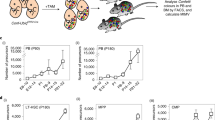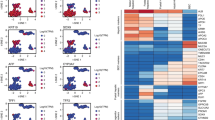Abstract
The liver of the neonatal mouse continues to show haematopoietic activity for up to 2 weeks after birth1,2 and morphological analysis has shown that this activity becomes focused in discrete haematopoietic colonies by the end of the first week postnatal3. Furthermore, each colony contains cells of one haematopoietic lineage only, that is, erythroid, myeloid or pre-B-lymphoid cells. This pattern of differentiation suggests that each colony is derived from a single committed precursor cell, which, if true, would represent the first demonstration of non-mixed haematopoietic colonies in normal development and would provide a useful system for studying the factors affecting the clonal diversity of haematopoietic stem cells and their lineage-committed progeny. Here we have analysed the haematopoietic foci in the liver of neonatal mouse chimaeras, using a newly developed ubiquitous in situ cell marker system which clearly demonstrates the clonal origin of these colonies.
This is a preview of subscription content, access via your institution
Access options
Subscribe to this journal
Receive 51 print issues and online access
$199.00 per year
only $3.90 per issue
Buy this article
- Purchase on Springer Link
- Instant access to full article PDF
Prices may be subject to local taxes which are calculated during checkout
Similar content being viewed by others
References
Kamps, W. A. & Cooper, M. D. J. Immun. 129, 526–531 (1982).
Velardi, A. & Cooper, M. D. J. Immun. 133, 672–677 (1984).
Grossi, C. E., Velardi, A. & Cooper, M. D. J. Immun. 135, 2303–2311 (1985).
McLaren, A. Mammalian Chimaeras (Cambridge University Press, 1976).
West, J. D. in Development in Mammals Vol. 3 (ed. Johnson, M. H.) 413–460 (Elsevier/North Holland, Amsterdam, 1978).
West, J. D. in Chimaeras in Developmental Biology (eds Le Douarin, N. & McLaren, A.) 39–67 (Academic, London, 1984).
Rossant, J. & Frels, W. I. Science 208, 419–421 (1980).
Siracusa, L. D. et al. J. Embryol. exp. Morph. 73, 163–178 (1983).
Rossant, J., Vijh, K. M., Siracusa, L. D. & Chapman, V. M. J. Embryol. exp. Morph. 73, 179–191 (1983).
Pietras, D. F. et al. Nucleic Acids Res. 11, 6965–6983 (1983).
Langer, P. R., Waldrop, A. A. & Ward, D. C. Proc. natn. Acad. Sci. U.S.A. 78, 6633–6637 (1981).
Peterson, A. C., Frair, P. M. & Wong, G. G. Biochem. Genet. 16, 681–690 (1978).
West, J. D. J. Embryol. exp. Morph. 36, 151–161 (1976).
Falconer, D. S. & Avery, P. J. J. Embryol. exp. Morph. 43, 195–219 (1978).
West, J. D., Bucher, T., Linke, I. M. & Dunnwald, M. J. Embryol. exp. Morph. 84, 309–329 (1984).
Rossant, J. & Chapman, V. M. J. Embryol. exp. Morph. 73, 193–205 (1983).
Author information
Authors and Affiliations
Rights and permissions
About this article
Cite this article
Rossant, J., Vijh, K., Grossi, C. et al. Clonal origin of haematopoietic colonies in the postnatal mouse liver. Nature 319, 507–511 (1986). https://doi.org/10.1038/319507a0
Received:
Accepted:
Issue Date:
DOI: https://doi.org/10.1038/319507a0
Comments
By submitting a comment you agree to abide by our Terms and Community Guidelines. If you find something abusive or that does not comply with our terms or guidelines please flag it as inappropriate.



